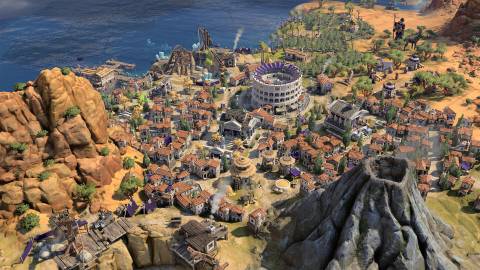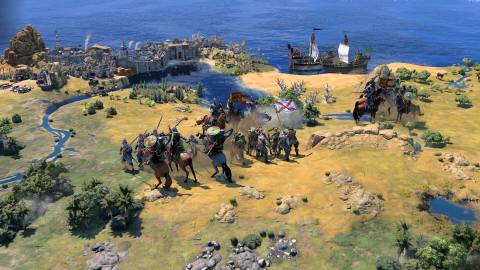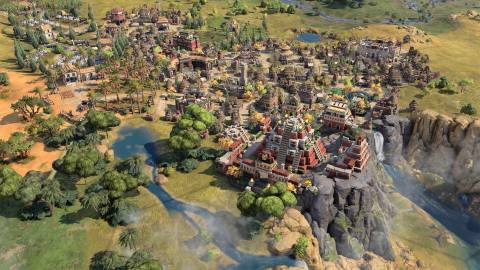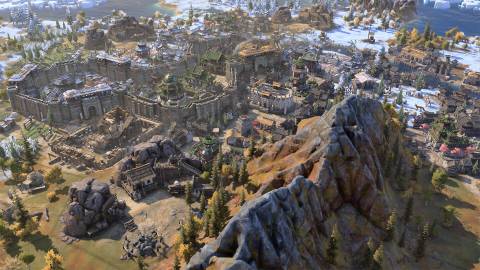How Overbuilding In Civilization 7 Works
Sid Meier's Civilization 7 is packed full of new and interesting mechanics, including a new feature for city development called "overbuilding." This mechanic lets leaders place new buildings on top of old ones from previous Ages, and can sometimes trigger certain Civ 7 narrative events or even award artifacts. Overbuilding is one of many gameplay features included in the latest installment of the franchise that results from the new Ages structure, which divides a campaign into three distinct parts. There is a major transition between each Age, where many features of that Age essentially reset for leaders to begin again in the new Age.
One major impact of these transitions is the hard reset of yields from cities and towns, where certain buildings that were placed from previous Ages no longer produce the same amount of resources as they did in the previous Age. There are exceptions to what type of building is affected by the Age transition, referred to as Ageless buildings, which do not lose their base yields. Ultimately, overbuilding is an essential part of ensuring each settlement is producing the optimal amount of resources, and allows leaders to cater their cities to specific needs.
What Overbuilding Does In Civ 7
Construct New Buildings On Top Of Old Ones With Overbuilding
The concept of overbuilding is simple: place a building from the current Age over one from the previous Age to update its efficacy. Overbuilding buildings doesn't occur until players reach the Exploration Age, but leaders are able to build over Improvements at any time. Improvements are basic upgrades to Rural tiles that can be "overbuilt" at any time with a qualifying building, which will convert it automatically into an Urban district. Once players reach the Exploration Age, Urban district tiles with Antiquity Age buildings in them will have diminished yields, making it ideal to build over on these districts to get the current Age's yield output.
When overbuilding, the current-Age building will replace whichever previous-Age building in the district has the lowest yields. Importantly, not all buildings can be overbuilt, and these are referred to as Ageless. Ageless buildings have bonuses that persist across the Ages, and they can be built in any Age. These buildings can be placed over Age-specific buildings, but cannot themselves be built over at any point, making their placement critical. Age-specific buildings will generally benefit from adjacency bonuses, while Ageless buildings are typically not adjacency-dependent and function as Warehouse buildings, providing boosts to specific improvements in a Settlement.
Overbuilding can be used to strategically upgrade and adapt cities or towns to the needs of each Age, and will help optimize yields on individual tiles. Essentially, districts at the beginning of each Age are reset to their lowest levels, requiring leaders to place current-Age buildings with better yields in order to progress. While a Market may have been producing excellent gold yields thanks to adjacent Wonders or Navigable Rivers, those adjacency bonuses disappear at the beginning of the Antiquity Age, and placing the Exploration Age Bazaar over that same place will restore the tile's bonuses.
Why Overbuilding Is Necessary In Civ 7
Ages Make Overbuilding Vital To Civilization Development
Overbuilding is absolutely essential to developing a functional civilization in Civ 7. Diminished yields will hold a leader back substantially if they aren't updated with new buildings. The type and amount of resources a leader needs across the Ages will change, and overbuilding is a tool to help navigate these shifts. Overbuilding allows leaders to develop their strategy and adapt to the demands of the campaign. For example, a particular city might become a pivotal military stronghold, and it would be more effective with a current-Age Military building to replace the low-yield buildings of a different resource type from a previous Age.
Overbuilding efficiency can also be enhanced or improved, and there are various features that speed up the overbuilding process, such as Social Policies or Traditions, Celebrations, Leader Attributes, etc. Overbuilding can also trigger narrative events or award unique items depending on which type of building is being built over (e.g., building over an Altar or Temple in the Modern Age awards an artifact). Pay close attention to the adjacency bonuses of each Age-specific building, as placement is crucial for these, taking into account factors such as Terrain type, nearby Wonders, and Resources within a Settlement.
As players get more familiar with the game, overbuilding will become a part of the natural evolution of Settlement development. At the start of each Age, priorities may shift or evolve based on circumstances in the campaign, and overbuilding gives leaders an opportunity to respond to those changes. Overbuilding can help enhance each civilization's individual strengths. Alternatively, failing to overbuild can result in a lackluster yield output in what might have been a once-thriving Settlement. Overall, players will benefit from understanding overbuilding and how it works in Civilization 7.







Sid Meier's Civilization VII
- Released
- February 11, 2025
- ESRB
- Everyone 10+ // Alcohol and Tobacco Reference, Mild Language, Mild Violence, Suggestive Themes
- Developer(s)
- Firaxis Games
- Publisher(s)
- 2K
- Multiplayer
- Online Multiplayer
- Franchise
- Sid Meier's Civilization
- Platform(s)
- PlayStation 5, PlayStation 4, Xbox Series X, Xbox Series S, Xbox One, Nintendo Switch 2, Nintendo Switch, PC











Your comment has not been saved